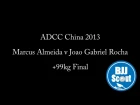Almeida Prado | th
Considered the biggest interpreter of Noel Rosa, Aracy de Almeida (Aug 19, 1914 - Jun 20, 1988) started singing in churches in the suburbs of Rio de Janeiro until being taken to the radio intermediary Custódio Mesquita in 1933. Soon she made radio fame as interpreter of the sambas of Philips, Mayrink Veiga, Ipanema and Tupi, and made history with fabulous interpretations of "Palpite Infeliz" (N. Rosa), "Tenha Pena de Mim" (C. Sousa/ Babaú), "Fez Bobagem (Brave Assis),"Camisa Amarela" (Ary Barroso) and "Feitiço da Vila" (N. Rosa/ Vadico). She was, next to Carmen Miranda, the biggest singer of sambas of...
Manuelcha Prado is one of the most well-known troubadours of Andean music. Born in Puquio, Ayacucho, Perú, Prado is a talented guitarist, composer, compiler, arranger and singer, and has performed in Europe, the United States, and South America. His repertoire comes from the vast Andean cultural heritage preserved by oral memory Quechua agricultural rituals, dance, celebratory ceremonies, funeral songs, carnivals and amusement waynos that express the feeling of a living culture that resists.
Fuente: Center for Latin American and Caribbean Studies at NYU.
Date: Thursday, October 25th, 2012
Enlace: http://clacs.as.nyu.edu/object/clacs.events.special.102512
http://www.manuelchaprado.pe/
http://www.manuelcha.com/ .
EDU DEL PRADO : SUS INICIOS
Edu nació en Valencia y desde niño se sintió cautivado por la música. Con 8 años, descubre en casa de sus abuelos un "cassette" de los Jackson Five, y el sonido mezclado del Funk y del Soul se le tatúa en el alma. Con tan solo 13 años, empieza su carrera cantando en pequeños locales de Madrid y Ginebra (Suiza), donde vivió temporalmente con su padre. Más tarde, se integra en algunos grupos como Younger Soul o Dibidibop y, tras años de esfuerzo y perseverancia, logra registrar sus primeras maquetas de la mano de...
Laurindo Almeida (September 2, 1917, São Paulo, Brazil–July 26, 1995, Van Nuys, California) was a Brazilian classical guitarist.
Prior to being invited to the United States in 1947 by Stan Kenton, Laurindo Almeida played guitar in Rio de Janeiro where he was known for his classical Spanish guitar playing. He joined Kenton's band during the height of its success in the 1940s, then was employed as a studio musician. In 1953 he recorded, with Bud Shank, two albums called Brazilliance for the World Pacific label. He also recorded with Baden Powell, Stan Getz and Herbie Mann, among others, and recorded...






